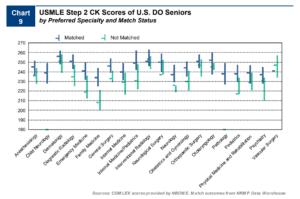How USMLE Step 1 Going Pass/Fail Will Affect DO Students

25226 Views
In 2022 the Step 1 scoring system changed from a scored exam to pass/fail. While this may sound like great news, as there is now less stress associated with Step 1, it is clear that this change will have significant secondary effects, particularly on students at Osteopathic medical schools. The most likely change is that the conversion of USMLE Step 1 to a pass/fail scoring system will likely cause USMLE Step 2 CK to become the standard by which residency programs measure and compare applicants for interviews and for the residency match.
Students who completed medical school at Osteopathic medical schools typically have a harder time obtaining a residency match compared to medical graduates from allopathic medical schools in the US. Osteopathic (or DO) students have the additional burden of taking the COMLEX series of exams that are required for licensure. However, this news, unfortunately, isn’t new. To compensate, many DO students have learned (or been told) that they need to have a higher USMLE Step 1 score compared to their American medical graduate counterparts in order to successfully match. Typically, most DO students take the USMLE Step 1 at the same time as the COMLEX Level 1, usually within several weeks of each other. Most DO students do not take the other USMLE Step exams because they are not required for licensure. Now, however, DO students will likely need to shift their USMLE strategy.
Take the following Step 2 CK graph taken from the NRMP 2022 match results for example:
The fundamental idea is that a DO student is considered a more risky residency applicant compared to an allopathic US medical graduate. Therefore a higher score on Step 1 suggests (to the residency program) that they are properly prepared for the program.
If we start with this premise, then we can dive a little bit deeper into the secondary effects of the USMLE Step 1 pass/fail decision for DOs. Using a little bit of logic, we can make the following predictions about what to expect in the future:
- DO students will start forgoing the USMLE Step 1 and start taking the USMLE Step 2 CK – this remains an option as it is still possible to take the Step 2 CK without taking Step 1 (whether you’re an MD or a DO student, though some MD school may have their own rules restricting this)
- DO students will need to focus on Step 2 CK to distinguish themselves in their residency applications as compared to allopathic graduates. This may increase the difficulty for DO students.
- DO students will need to be even more proactive about Step 2 CK prep because their academic schedules may not have time for dedicated preparation after clinical rotations.
- COMLEX Level 2 will likely be taken in tandem with USMLE Step 2 CK which may create significant strain on students schedules as they try to carve out dedicated study time.
- COMLEX Level 1 is likely to continue reporting 3 digit scores, so performance on this test may still matter.
- It will be more important than ever for DO students to make connections with academic clinicians/faculty.
Let’s take a closer look at why each of the hypotheses may become a reality.
DO Students Will Forgo Step 1 for Step 2 CK:
This is pretty obvious because DO students have no obligation to take any of the USMLE exams. Osteopathic students have taken Step 1 in order to provide a direct comparative measure that residency programs can use to assess their applications versus those from allopathic medical schools. With a pass/fail Step 1, DO students have to use Step 2 CK as a way to provide a direct comparison to their peers from allopathic medical schools. DO students will still need to take COMLEX Level 1 before sitting for COMLEX Level 2 as this is an NBOME requirement. However, there is no requirement for them to take USMLE Step 1 prior to taking USMLE Step 2 CK.
Difficulty Distinguishing Themselves in Residency Applications:
It is unclear if the residency application process will become more difficult for DO students, but it is more likely that it will be harder. According to the NRMP’s 2022 match results, US DO students had a lower match rate across all specialties when compared to US MD students. Lack of a numerical score for Step 1 removes another objective measure with which DO students can compare themselves to other candidates. It also pushes DO students to take Step 2 CK rather than Step 1. Currently, Osteopathic students typically take Step 1 in tandem with COMLEX Level 1 and have both scores, which they can decide to share on their residency applications. Most DO students do not take Step 2 CK as it is not required and rarely provides any advantage. With the change, DO students will now need to prepare for Step 2 CK, and this will need to be squeezed in with COMLEX Level 2 after clinical rotations are completed. Since most Osteopathic medical schools maintain a traditional curricular calendar with students completing core clinical rotations in June, there will be little or no time to create a dedicated study period for Step 2 CK. This puts DO students at a competitive disadvantage and it may negatively impact their Step 2 CK performance.
Difficulty Finding Time to Prepare for Step 2 CK
For many DOs, their medical education has not been oriented towards the COMLEX and USMLE exams. Their medical school curriculum calendars are set up to match the need for time to do dedicated preparation for both exams the Step 1 and the Level 1 exam in tandem.
In the current system, Osteopathic students often have to carve out specific time where they can do dedicated study for Level 2 and possibly Step 2 CK. With the emphasis now shifting to Step 2 CK, it may be harder to find the dedicated time because it will naturally occur after clinical rotations are completed. DO students will need to be very very proactive about preparing for Step 2 CK and Level 2 during their clinical rotations. The presence of Shelf exams at the end of each rotation is helpful in this regard. However, clinical rotations are very time intensive and stressful periods in any medical students’ education. It is the time when a ‘green’ student ripens into a future doctor. Devoting time to dedicated Step 2 CK prep at the end of long clinical days (e.g. on the surgery rotation) will be tough. Only the most motivated students are likely to able to maintain the required intensity on their own. The bottom line is that early preparation and planning for these exams will be key moving forward–especially for the Step 2 CK and Level 2 tandem.
Higher scores are attractive to residencies not just because they may correlate with a stronger or smarter resident, but because it suggests the resident will have less difficulty with future standardized exams. If you weren’t already aware, there are lots of exams during residency and even afterward. All DO medical students or residents will need to take the COMLEX Level 3 in order to obtain a medical license. This is the bare minimum. Internship and residency programs are required to give their trainee two days off to complete Level 3, but it’s not something they are happy about. They lose a worker–I mean a trainee–for 2 days then that person needs to be covered by another resident. If the resident fails Level 3, then they need to retake it and miss more days of service.
Additionally, a prior failure may require the program to provide dedicated time off from service. In almost every field, there are also yearly In-training or In-service exams, usually called by some acronym involving I-T-E. If you are a surgery resident, you will take the ABSITE every year of your residency training. Poor performance on the ABSITE can in certain cases lead to dismissal from a surgery training program. So, as you can see, a record of strong test performance helps a residency program reduce the risk of losing their resident to exam prep, or in the case of surgery, lose their resident altogether.
COMLEX Scores Have Also Become Pass/Fail
About 10 months after NBME announced USMLE Step 1 would be is going to pass/fail, NBOME announced that COMLEX Level 1 would also be adapting this scoring model. DO residency applicants will still be required to send their COMLEX transcript to ERAS so that it can be sent to residencies for their applicant review, but it will not contain a numerical score. Without COMLEX Level 1 or USMLE Step 1 numerical scoring, it will be important for DO students to make sure their residency applications are strong in other areas so that candidates may differentiate themselves to program directors. Moving forward, application areas such as letters of recommendation in your desired specialty, relevant research experience, and clerkship grades will hold more and more weight in deciding if you will be accepted into a given program. In addition, there will likely be pressure to perform well on Level 2-CE as well as on Step 2CK. This is one of the unintended consequences of the change. See our blog post on this topic for more information on standing out in residency applications.
Connect with Clinicians at Academic Training Programs
Without a Step 1 or Level 1 score DO students will need to find additional ways to strengthen their application. Previously, a strong Step 1 and COMLEX Level 1 & 2 score created a great platform on which to build a strong residency application. With only Step 2 CK and Level 2 providing a numerical score, applicants and the residency programs they apply to will look for other ways to distinguish applicants. Similar to Hollywood, a lot of decisions in medicine are based on personal connections. If the residency director considering an applicant knows the applicant well that is best. If they know the person recommending the applicant that’s also excellent. If the residency program director doesn’t know the person referring the applicant but does know their institution then by proxy, there is an additional level of trust in the quality of the applicant. Thus, the more a DO student can make connections with clinicians, researchers, and senior trainees (upper level residents and fellows) at a medical center, the better they will position themselves later on in the residency application cycle. If a DO can develop strong ties at one institution that is great. If they can do that at more than one institution even better. The key though is to create ‘strong’ connections, and that usually requires more than just doing a single rotation at a particular site.
If you have further questions about what the USMLE Step 1 score change from numeric to pass/fail means for you, please do not hesitate to contact us here. In addition, if you have a USMLE Step 1 test date before January 1st, 2022 and would like help preparing, please take a look at our USMLE Step 1 tutoring page if 1-on-1 tutoring could be right for you.
Featured Articles

